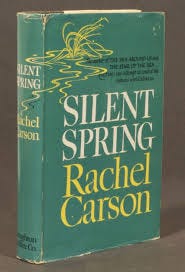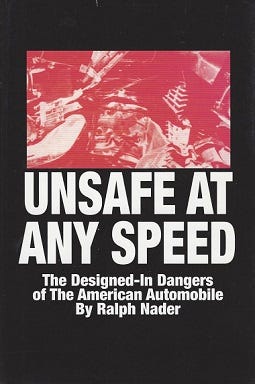Why the Poor Stay Poor in America - The Power Of Words
Welcome to Crime and Punishment: Why the Poor Stay Poor in America. I’m thrilled that you signed up to read my newsletter, and I hope that together, we can make a difference.
“It is the public that is being asked to assume the risks that the insect controllers calculate. The public must decide whether it wishes to continue on the present road, and it can do so only when in full possession of the facts… We still talk in terms of conquest. We still haven’t become mature enough to think of ourselves as only a tiny part of a vast and incredible universe. Man’s attitude toward nature is today critically important simply because we have now acquired a fateful power to alter and destroy nature.” Rachel Carson, from a 1963 CBS interview It’s a tad ironic, isn’t it, that I sit before an essentially blank page, (save for the words of an iconic writer), with the title “The Power of Words” looming over me, while I ponder something semi-important to say… Rachel Carson has been an inspiration to me since I first read Silent Spring shortly before I entered high school, nearly a decade after the book was published, and she remains an inspiration today. This book is one of the many I read as a teen that influenced my thinking and directed my passions, and probably why I declared in my first class, on the first day of high school, that I wanted to practice environmental law. It’s hard to believe that one person could be this prescient, but just look at the the few sentences I quoted above. Essentially, Carson says that our citizens must have access to all of the facts before making an informed decision to assume the risks that are inherent in the use of certain products, in this case the wide use of pesticides, particularly DTD. And as a species, humans have to be “mature” enough to realize that we cannot conquer nature, but instead must learn to live in harmony with the natural world. Another seminal book, Ralph Nader’s Unsafe At Any Speed, The Designed-In Dangers of The American Automobile, was published in 1965, a few years after Carson’s book . This 2015 New York Times article celebrating the 50th anniversary of its publication, details Nader’s early interests and what led him to examine the issue of automobile safety. He started his research in 1956 while a student at Harvard Law School and was inspired “by books that prompted change”, specifically noting Silent Spring. His book “shook the automobile industry” and soon Nader was testifying before Congress, which led to the establishment of a new agency and federal laws to regulate the automobile industry.
This federal agency, the National Highway Traffic Safety Administration (NHTSA), published a report in 2015 summarizing the impact of federal automobile safety standards:
Even Nader’s foes in the auto industry admitted that his book and Congressional testimony had a positive impact:
Rachel Carson also testified before Congress after Silent Spring was published, and her testimony, along with the discussions it provoked, sparked the environmental movement, including numerous federal laws to protect the environment from industrial practices, from the manufacture and use of pesticides to the Clean Air Act, Clean Water Act, and the regulation of solid and hazardous waste, among others. Even the American Chemical Society, in a booklet written in 2012 to commemorate the 50th anniversary of the publication of Silent Spring, stated that:
With decades of hindsight (and the articulate voices of important writers), I better understand that words, in the the right hands, are powerful tools to change our thinking as individuals and as a society. And often those words are captured in federal laws that in turn, save millions of lives and transform our society Today, easily a third of our population wants government totally out of our lives. “Big government”, including the laws that regulate how companies conduct business, laws that protect consumers, our health and environment are anathema to them and viewed as an unnecessary intrusion upon their right to conduct themselves as they please. But you are the people I want to hear from. What do you think about government regulation and the issues raised in this post? How far has our thinking progressed in the six decades since the publication of Silent Spring and Unsafe At Any Speed ? Have we matured yet? And finally, what books do you think impacted our society for good or ill? Please share your thoughts in the Comment Section below. And to help me celebrate a full six months of publishing Crime and Punishment, why not sign up for a free or paid subscription to help me continue my work! Additional Reading:A list of resources I used in this post plus a special link to Business Insider’s list of the “Books That Changed American Policy” 4. https://archive.nytimes.com/www.nytimes.com/books/97/10/05/reviews/carson-obit.html?simple=True 5. https://www.businessinsider.com/books-that-changed-american-policy-2018-4 You’re on the free list for Crime and Punishment: Why the Poor Stay Poor In America. All posts are free for now, but if you’d like to get ahead of the crowd, feel free to support my work by becoming a paid subscriber. |
Older messages
Accidental Injury and Death:
Saturday, March 19, 2022
Listen now (9 min) | How And Why Tragedy Intersects With Poverty
Sunday Evening Reads
Monday, March 14, 2022
A Mishmash Of Recommended Readings and Viewings
A Windfall Profits Tax
Saturday, March 12, 2022
Listen now (6 min) | Should the Big Oil Companies Be Taxed To Even the Playing Field?
Sunday Evening Reads
Monday, March 7, 2022
Russian Oil Imports
What Poverty Looks Like In America
Saturday, March 5, 2022
Listen now (5 min) | And Why You Should Care
You Might Also Like
Kendall Jenner's Sheer Oscars After-Party Gown Stole The Night
Tuesday, March 4, 2025
A perfect risqué fashion moment. The Zoe Report Daily The Zoe Report 3.3.2025 Now that award show season has come to an end, it's time to look back at the red carpet trends, especially from last
The FDA Just Issued a Recall on a Supplement — Because it Contains an ED Drug
Monday, March 3, 2025
View in Browser Men's Health SHOP MVP EXCLUSIVES SUBSCRIBE The FDA Just Issued a Recall on a Supplement — Because It Contains an ED Drug The FDA Just Issued a Recall on a Supplement — Because It
10 Ways You're Damaging Your House Without Realizing It
Monday, March 3, 2025
Lenovo Is Showing off Quirky Laptop Prototypes. Don't cause trouble for yourself. Not displaying correctly? View this newsletter online. TODAY'S FEATURED STORY 10 Ways You're Damaging Your
There Is Only One Aimee Lou Wood
Monday, March 3, 2025
Today in style, self, culture, and power. The Cut March 3, 2025 ENCOUNTER There Is Only One Aimee Lou Wood A Sex Education fan favorite, she's now breaking into Hollywood on The White Lotus. Get
Kylie's Bedazzled Bra, Doja Cat's Diamond Naked Dress, & Other Oscars Looks
Monday, March 3, 2025
Plus, meet the women choosing petty revenge, your daily horoscope, and more. Mar. 3, 2025 Bustle Daily Rise Above? These Proudly Petty Women Would Rather Fight Back PAYBACK Rise Above? These Proudly
The World’s 50 Best Restaurants is launching a new list
Monday, March 3, 2025
A gunman opened fire into an NYC bar
Solidarity Or Generational Theft?
Monday, March 3, 2025
How should housing folks think about helping seniors stay in their communities? ͏ ͏ ͏ ͏ ͏ ͏ ͏ ͏ ͏ ͏ ͏ ͏ ͏ ͏ ͏ ͏ ͏ ͏ ͏ ͏ ͏ ͏ ͏ ͏ ͏ ͏ ͏ ͏ ͏ ͏ ͏ ͏ ͏ ͏ ͏ ͏ ͏ ͏ ͏ ͏ ͏ ͏ ͏ ͏ ͏ ͏ ͏ ͏ ͏ ͏ ͏ ͏ ͏ ͏ ͏ ͏ ͏ ͏ ͏ ͏ ͏
The Banality of Elon Musk
Monday, March 3, 2025
Or, the world we get when we reward thoughtlessness ͏ ͏ ͏ ͏ ͏ ͏ ͏ ͏ ͏ ͏ ͏ ͏ ͏ ͏ ͏ ͏ ͏ ͏ ͏ ͏ ͏ ͏ ͏ ͏ ͏ ͏ ͏ ͏ ͏ ͏ ͏ ͏ ͏ ͏ ͏ ͏ ͏ ͏ ͏ ͏ ͏ ͏ ͏ ͏ ͏ ͏ ͏ ͏ ͏ ͏ ͏ ͏ ͏ ͏ ͏ ͏ ͏ ͏ ͏ ͏ ͏ ͏ ͏ ͏ ͏ ͏ ͏ ͏ ͏ ͏ ͏ ͏ ͏ ͏ ͏
“In life I’m no longer capable of love,” by Diane Seuss
Monday, March 3, 2025
of that old feeling of being / in love, such a rusty / feeling, ͏ ͏ ͏ ͏ ͏ ͏ ͏ ͏ ͏ ͏ ͏ ͏ ͏ ͏ ͏ ͏ ͏ ͏ ͏ ͏ ͏ ͏ ͏ ͏ ͏ ͏ ͏ ͏ ͏ ͏ ͏ ͏ ͏ ͏ ͏
Your dishwasher isn’t a magician
Monday, March 3, 2025
— Check out what we Skimm'd for you today March 3, 2025 Subscribe Read in browser Together with brad's deals But first: 10 Amazon Prime benefits you may not know about Update location or View



